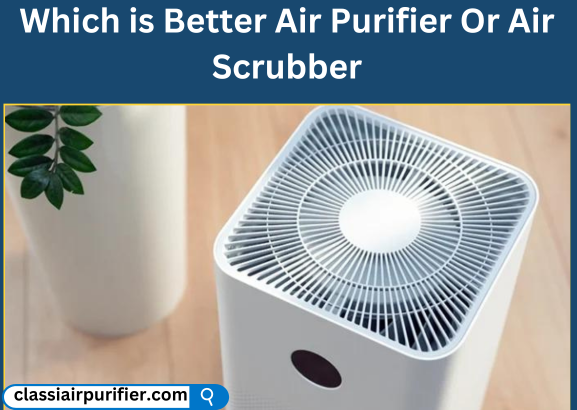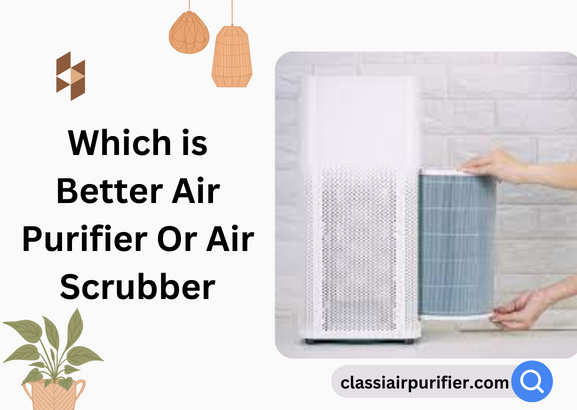An air purifier and air scrubber serve different purposes. An air purifier is better for removing airborne particles and allergens in a smaller space, while an air scrubber is more effective in eliminating mold, odors, and chemicals in a larger area.
When choosing between an air purifier and air scrubber, it’s important to assess your specific air quality needs. Understanding the key differences between the two can help you make an informed decision for your indoor air purification needs. Air purifiers are designed to remove particles such as dust, pollen, and pet dander from the air, making them a great choice for individuals with allergies or respiratory issues.
On the other hand, air scrubbers are more suitable for addressing mold, mildew, and volatile organic compounds (VOCs) in larger spaces, making them ideal for commercial or industrial settings. Each device offers unique benefits, and selecting the right one depends on the specific air quality challenges you are facing.
Functionality
When it comes to improving indoor air quality, two common devices come to mind: air purifiers (AP) and air scrubbers (AS). While both have the same goal, which is to clean the air we breathe, their functionality and features differ. Understanding the differences and capabilities of each can help you make an informed decision when choosing between an air purifier or an air scrubber to improve the air quality in your home or office.
Air Purifier Features
An air purifier is designed to remove impurities from the air, such as dust, pollen, pet dander, and smoke particles. It consists of a series of filters that capture these particles and trap them, preventing them from circulating back into the environment. Some key features of air purifiers include:
- HEPA Filters: High-Efficiency Particulate Air (HEPA) filters are the standard in air purifiers. These filters can capture up to 99.97% of particles as small as 0.3 microns. They are highly effective in reducing allergens and improving overall air quality.
- Activated Carbon Filters: These filters help remove odors and volatile organic compounds (VOCs) from the air. They are especially useful for eliminating unpleasant smells caused by cooking, pets, or chemicals.
- UV-C Light: Some air purifiers use ultraviolet germicidal irradiation (UVGI) technology to kill bacteria and viruses. The UV-C light damages the DNA of these microorganisms, preventing them from reproducing and causing harm.
- Smart Features: Many modern air purifiers come with smart features like Wi-Fi connectivity and mobile apps. These features allow you to control and monitor the air purifier remotely, set schedules, and receive alerts about filter replacement.
- Noise Level: Air purifiers can produce varying levels of noise. Some models have a noise reduction feature that ensures silent operation, making them suitable for use in bedrooms or offices where quietness is crucial.
Air Scrubber Features
An air scrubber differs from an air purifier in terms of its functionality. While both devices clean the air, air scrubbers are primarily designed to remove microorganisms and chemicals from the environment. Here are some features of air scrubbers:
- Advanced Filtration: Air scrubbers use a combination of filters, including HEPA filters and activated carbon filters, to remove airborne particles and impurities. These filters work together to effectively trap and eliminate bacteria, viruses, mold spores, and VOCs.
- Ozone-Free Operation: Unlike some air purifiers that produce trace amounts of ozone, air scrubbers are ozone-free. This feature makes air scrubbers suitable for individuals who are sensitive to ozone or have respiratory conditions like asthma.
- Continuous Air Cleaning: Air scrubbers run continuously to maintain the cleanliness of the air. They are often installed as part of HVAC systems and can treat the air throughout the entire space, ensuring consistent air quality.
- High-Efficiency: Air scrubbers are highly efficient in removing contaminants and maintaining clean air. They can effectively mitigate the spread of airborne pathogens in hospitals, schools, and commercial buildings, where infection control is crucial.
In Summary
When choosing between an air purifier and an air scrubber, consider your specific needs and the functionality that aligns with those needs. Air purifiers excel at removing allergens and odors, while air scrubbers are effective in disinfecting and neutralizing pathogens. Assess the air quality concerns in your environment and select the device that best addresses those concerns to achieve cleaner and healthier indoor air.
Effectiveness
Effectiveness is a crucial factor to consider when choosing between an air purifier and an air scrubber. Understanding how well each device can eliminate pollutants and improve air quality is essential in making an informed decision.
Pollutant Removal Efficiency
When it comes to pollutant removal efficiency, both air purifiers and air scrubbers are effective tools for improving indoor air quality. Air purifiers primarily rely on filters to capture and remove airborne particles such as dust, pollen, pet dander, and mold spores. Meanwhile, air scrubbers use a combination of filters and scrubbing technologies to eliminate a wider range of pollutants, including volatile organic compounds (VOCs), odors, and chemical fumes. This makes air scrubbers more versatile in addressing a broader spectrum of indoor air contaminants.
Air Quality Improvement
In addition to pollutant removal, air quality improvement is a key consideration when evaluating the effectiveness of air purifiers and air scrubbers. Air purifiers can effectively reduce the concentration of particulate matter in the air, leading to improved indoor air quality. However, air scrubbers go a step further by not only removing particles but also neutralizing odors and VOCs, which can significantly enhance the overall air quality. This makes air scrubbers a more comprehensive solution for achieving clean and fresh indoor air.
Cost Analysis
When evaluating the decision between an air purifier and an air scrubber, considering the cost becomes imperative. Understanding the initial investment and ongoing maintenance expenses associated with each option is essential in making an informed decision. Let’s delve into the cost analysis of air purifiers and air scrubbers to determine which option offers the best value.
Initial Investment
The initial investment for an air purifier typically ranges from $100 to $1000, depending on the size, technology, and brand. On the other hand, an air scrubber may require a larger upfront investment, ranging from $500 to $5000. The cost varies based on the capacity and the system’s efficiency. While air purifiers come in a wide price range, air scrubbers generally require a higher initial financial outlay.
Maintenance Expenses
When it comes to maintenance expenses, air purifiers tend to have lower ongoing costs. Replacement filters for air purifiers may need to be changed every 6 to 12 months for an average cost of $20 to $100 per filter. In contrast, air scrubbers often require more frequent filter changes and larger, more costly replacements. Filters for air scrubbers might need to be replaced every 3 to 6 months with costs ranging from $50 to $300 per filter. Additionally, air scrubbers may need periodic professional maintenance, adding to the overall maintenance expenses.
Suitability
In determining whether an air purifier or an air scrubber is a better choice for your needs, considering the suitability of each option is crucial. Evaluating the suitability involves assessing the specific residential and commercial/industrial applications where these devices can be effectively utilized.
Residential Applications
For residential purposes, an air purifier proves to be a more practical choice. These devices are designed to filter and clean the air by removing various pollutants, such as dust, pet dander, pollen, and mold spores. By effectively capturing these particles, air purifiers help create a healthier and more breathable environment within your home. They are particularly beneficial for households with individuals who suffer from allergies or respiratory conditions.
Commercial/industrial Use
When it comes to commercial or industrial settings, an air scrubber is typically the preferred option. Air scrubbers are powerful machines that are capable of not only filtering the air but also actively removing noxious odors, chemicals, and harmful gases from the environment. These devices are commonly used in construction sites, factories, and laboratories, where there is a higher level of airborne pollutants and the need for cleaner air is more critical.
Now that we’ve discussed the suitability of air purifiers and air scrubbers in different applications, it’s important to evaluate your specific requirements. Consider the purpose of the device, the size of the area you want to purify or scrub, and the nature of the pollutants you need to address. By carefully assessing these factors, you can make an informed decision about which option is better suited to meet your air quality needs.
Portability & Installation
Ease Of Moving
Air purifiers are generally lightweight and easy to move around different rooms.
Installation Requirements
Air purifiers require minimal installation – plug and play functionality.
Noise Level
Air purifiers and air scrubbers both aim to improve indoor air quality, but one key difference is the noise level. While air purifiers are designed to operate quietly, air scrubbers may generate more noise due to their powerful filtration systems.
Consider your noise tolerance when deciding which is the better option for your needs.
Noise level is an essential factor to consider when choosing between an air purifier and an air scrubber. Both operating noise level comparison and silent operation features play a crucial role in deciding the right option for your needs.
Operating Noise Comparison
- Air purifiers are generally quieter than air scrubbers due to their filtration system.
- Some air purifiers produce as low as 25 decibels of noise during operation.
- On the other hand, air scrubbers may produce higher noise levels, ranging from 35 to 70 decibels.
Silent Operation Features
- Look for air purifiers with ultra-quiet motor technology for minimal noise disruption.
- Consider air scrubbers with noise-reduction features such as soundproof enclosures.
Frequently Asked Questions On Which Is Better Air Purifier Or Air Scrubber
Are Air Purifiers Effective For Removing Airborne Contaminants?
Yes, air purifiers are effective for removing various airborne contaminants such as dust, pollen, pet dander, and mold spores. They work by filtering out these particles from the air, leading to cleaner and healthier indoor air quality.
What Is The Difference Between An Air Purifier And An Air Scrubber?
An air purifier is designed to remove particles and pollutants from the air, while an air scrubber goes a step further by also targeting odors, gases, and volatile organic compounds (VOCs). Air scrubbers use more advanced filtration systems for comprehensive air purification.
Do Air Scrubbers Help In Reducing Indoor Odors?
Yes, air scrubbers are effective at reducing indoor odors caused by smoke, cooking, pets, and other sources. They use advanced filtration technologies to capture and neutralize odor-causing particles and gases, resulting in fresher and cleaner indoor air.
Can Air Purifiers Or Air Scrubbers Help With Allergies And Asthma?
Both air purifiers and air scrubbers can help alleviate allergy and asthma symptoms by removing allergens and irritants from the air. They reduce airborne triggers such as dust mites, pollen, and pet dander, creating a healthier environment for individuals with respiratory issues.
Conclusion
When deciding between an air purifier or an air scrubber, it ultimately comes down to your specific needs and preferences. Both devices offer unique benefits in improving indoor air quality. An air purifier is perfect for removing airborne pollutants, while an air scrubber is more effective in eliminating odors, mold, and other contaminants.
Consider the size of your space, the type of pollutants you want to target, and the level of purification required. Choose the option that best suits your requirements and enjoy breathing in clean, fresh air.


